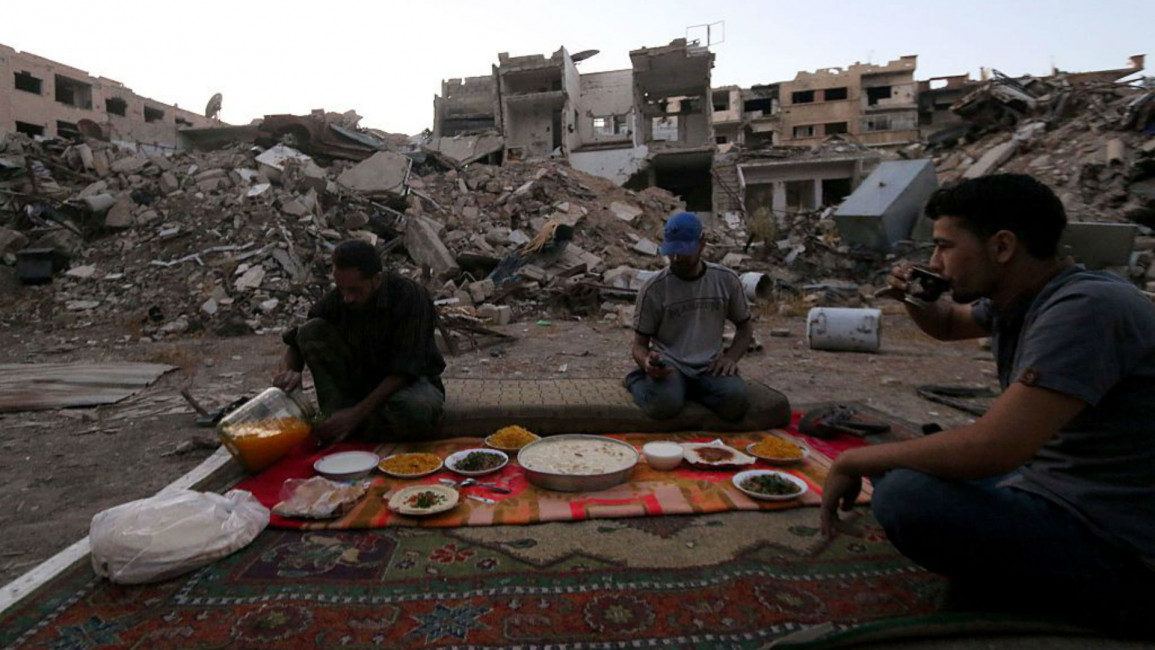
Ramadan was once a special time for Syrians, today it's about survival
As a Syrian, Ramadan makes me think of my home city of Damascus more than ever.
Damascus had a special charm before the war. The ancient city was once seen as the cradle of civilisation, home to not only 1.7 million Syrians of all faiths and none, but numerous archaeological sites, historical churches and mosques. Many cultures have left their mark on the city and its people. For me though, one of the most special aspects of Damascus was the way people came together during the holy month of Ramadan.
That is why, as Ramadan comes to an end this week, my memories of Syria are at the forefront of my mind.
Syrians are proud of their traditions and customs during this holy time. I remember how markets bustled with shoppers, the facades of houses decorated, and mosques would sparkle with special lights. Traffic jams seemed to fill every road, a sign that people were even busier than usual.
Mothers devoted themselves to the preparation of Eid desserts - pastries stuffed with walnuts or pistachios - and many hurried to take food and sweets to the poor. It was a time for giving charity - 'Zakat' – to those less fortunate, and a time for social solidarity.
 |
Families are forced to eat soup made from boiled grass as a means of avoiding starvation |  |
At Ramadan, relatives and neighbours exchanged visits and food, with many using the month as a opportunity for reconciling their differences.
Syrians consider Ramadan to be the month of family reunion: A rare opportunity to reunite around the breakfast table.
I remember being in my aunt's house, with 17 of around the same table, eating, talking and sharing stories. As a teenager I could hardly wait for the fast to be over, I remember my father telling me that Ramadan is not about being hungry. It is about tolerance, patience and improving ourselves as human beings.
Read more: A lesson on overindulgence during Ramadan
Ramadan reminds me of a happier time, long before the violence.
Twitter Post
|
For centuries, Syrians of different faiths and sects lived side by side. One of my best friends in school, a Christian girl, would not eat in front of me during Ramadan, even though I assured her that I was not upset at all. Some of my Christian friends even tried to fast with us (although most gave up by lunchtime!) and many opted not to eat in public places out of respect.
I had friends from all sects and faiths, and I never felt any difference between us. We were all Syrians.
But war has changed Syria. The economic situation, poverty, and years of living under brutal dictatorship have forced many to sacrifice their traditions.
Just staying alive is hard enough.
Before the war, extravagance during religious and spiritual events was common, especially in this holy month. But this is a far cry from life today.
Families are forced to eat soup made from boiled grass as a means of avoiding starvation. Hundreds of thousands of Syrians have been displaced and made homeless. There are parents who have lost children, and children who have lost parents.
In some cases, whole families have been wiped out. Despite this, there are still Syrians who are defiant that war and terror will not interfere with their faith. But it is hard to keep your traditions alive when you have lost so much.
For ordinary civilians, it is clear to us who and what is responsible: The double evil of Assad, and terrorism.
Their horrors are two sides of the same coin. While Bashar al-Assad and his family live in luxury, ordinary Syrians live in poverty: His face is emblazoned on bank notes, despite the fact most ordinary Syrians no longer have any money to spend. There is a disturbing irony in this.
 |
Assad's face is emblazoned on bank notes, despite the fact most ordinary Syrians no longer have any money to spend |  |
Meanwhile, terrorist group such as Islamic State (IS) and al-Qaeda pretend that they represent Islam, when in reality this could not be further from the truth: They murdered and tortured Muslims and non-Muslims alike; Sunnis and Shias. They embody the polar opposite of the teachings of the Quran, which emphasise mercy, compassion and kindness.
It was once hard to imagine that I could ever live outside Syria, especially during the holy month. But the UK has helped me to try to build a home, and has allowed me to practice my faith in peace. This means a lot to me, and I know that it is modern democracy which allows people to be truly free to observe their faith.
Syrians deserve the same right.
It is painful to think about what has happened to my country but those of us lucky enough to have a voice know that ordinary Syrians still hope for a better future. That is why although it is difficult, Ramadan gives us an opportunity to pray for Syria and to pray for its people.
Whatever your beliefs, please help us hope that next year Syria's story will be different - with human rights and kindness at its core.
Bahia Mardini is a human rights campaigner and the founder of Syrian House, an organisation dedicated to helping Syrians in the UK access information and support.
She specialises in human rights and democracy in the Middle East and was a media consultant in the National Coalition for Syrian Revolutionary and Opposition Forces, and was the director of the media office of the opposition delegation in the peace negotiations in Geneva 2012.
Follow her on Twitter: @BahiaAlMardini1
Opinions expressed in this article remain those of the author and do not necessarily represent those of The New Arab, its editorial board or staff




